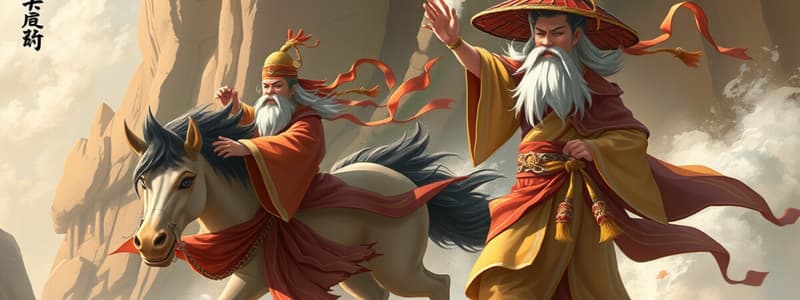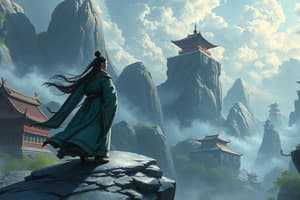Podcast
Questions and Answers
What is Journey to the West loosely based on?
What is Journey to the West loosely based on?
- A fictional story
- A historical event during the Ming dynasty
- A real pilgrimage of a Buddhist priest (correct)
- A satirical commentary on religion
What does the name Sun Wukong mean?
What does the name Sun Wukong mean?
Wake-to-vacuity
What motivates the monkey king to seek immortality?
What motivates the monkey king to seek immortality?
- To become a deity
- Desire for power
- To find a king
- Fear of mortality (correct)
Who volunteers to seek the scriptures in the chapter Tripitaka's Departure?
Who volunteers to seek the scriptures in the chapter Tripitaka's Departure?
What do Tripitaka and his disciples struggle against in the Land of the Daoists?
What do Tripitaka and his disciples struggle against in the Land of the Daoists?
In Chapter 53, what do Pigsy and Tripitaka become after drinking from the Mother Child stream?
In Chapter 53, what do Pigsy and Tripitaka become after drinking from the Mother Child stream?
Tripitaka accepts the empress's offer for marriage.
Tripitaka accepts the empress's offer for marriage.
What creature do Tripitaka and his disciples encounter after being blown off course?
What creature do Tripitaka and his disciples encounter after being blown off course?
Tripitaka and his disciples are granted the position of immortal Buddhas upon returning to China.
Tripitaka and his disciples are granted the position of immortal Buddhas upon returning to China.
What does Journey to the West criticize in terms of religion?
What does Journey to the West criticize in terms of religion?
What representation does the blank scroll symbolize?
What representation does the blank scroll symbolize?
Flashcards
Who is Tripitaka?
Who is Tripitaka?
The Buddhist priest during the Tang Dynasty embarking on a quest for scriptures.
Who is Sun Wukong?
Who is Sun Wukong?
Emerges from a divine stone and becomes the King of Monkeys.
Who is Bajie?
Who is Bajie?
Represents humanity's physical nature through appetite and strength.
Who is Sandy?
Who is Sandy?
Signup and view all the flashcards
What is Buddhism?
What is Buddhism?
Signup and view all the flashcards
What is Taoism (Daoism)?
What is Taoism (Daoism)?
Signup and view all the flashcards
What is Confucianism?
What is Confucianism?
Signup and view all the flashcards
What do the blank scrolls symbolize?
What do the blank scrolls symbolize?
Signup and view all the flashcards
What does the 'Journey to the West' represent?
What does the 'Journey to the West' represent?
Signup and view all the flashcards
What function does Journey to the West employ?
What function does Journey to the West employ?
Signup and view all the flashcards
Tripitaka's Buddhism
Tripitaka's Buddhism
Signup and view all the flashcards
Study Notes
Origins of the Story
- Journey to the West derives from numerous retellings across different media like theatre and oral traditions.
- It is inspired by the real pilgrimage of the Buddhist priest Hsuan during the Tang dynasty.
Chapter 1 Summary: Sun Wukong's Birth
- A stone monkey emerges from a divine stone, emerging as the King of Monkeys.
- Monkeys find a waterfall and vow to make whoever enters as their king.
- The monkey king discovers a mansion beyond the waterfall and settles there.
- Fearing mortality, he seeks out immortality and meets an immortal at The Mountain of Mind and Heart, receiving the name Sun Wukong.
Chapter 12 Summary: Tripitaka's Departure
- Tripitaka, a Buddhist priest during the Tang Dynasty, is ordered by the Emperor to recite Buddhist texts at a festival.
- An immortal monk offers a cloak to Tripitaka for free due to his virtuous nature.
- The monk reveals superior scriptures, prompting Tripitaka’s quest to retrieve them from the west.
Chapter 44 Summary: Land of the Daoists
- Tripitaka and his disciples, Sun Wukong, Pigsy, and Sandy, disguise themselves as Daoists to infiltrate an event.
- They sneak into a feast, but eventually must outsmart their captors.
- Sun Wukong uses his magical abilities to succeed in passing tests and escape.
Chapter 46 Summary: Competition with the Taoists
- In a Daoist-controlled land, Tripitaka's group must compete to gain freedom.
- Sun Wukong displays his magic, transformatively defeating various challenges posed by the Daoists.
Chapter 53 Summary: Impregnated by Water
- Tripitaka and his disciples enter a woman's only domain and accidentally drink from the Mother Child stream, resulting in unexpected pregnancy.
- They learn of a water source necessary to reverse this condition, leading to a confrontation with a Daoist.
Chapter 54 Summary: Kingdom of Women
- The disciples reach a kingdom governed by women, where Tripitaka is proposed as a husband.
- Pigsy eagerly accepts on Tripitaka's behalf, but Tripitaka, valuing his celibacy, devises an escape plan.
Chapter 55 Summary: Scorpion Monster
- Pigsy is attacked by a scorpion monster, prompting Bodhisattva's appearance for guidance.
- Together with Lord Orionis, who becomes a giant rooster, they defeat the monster and heal Pigsy.
Chapter 98 Summary: The Blank Scroll
- Tripitaka and his disciples are offered scrolls by Buddha but receive blank ones initially.
- These blanks symbolize the deeper wisdom about truth that their society struggles to understand.
Chapter 99 Summary: The Turtle
- While returning with scriptures, a trial causes them to encounter a turtle seeking knowledge in exchange for ferrying them across a river.
- Their failure to inquire about his lifespan results in losing part of the scriptures.
Chapter 100 Summary: The Reward
- Upon returning to China, they present scriptures to the emperor and are rewarded with a lavish feast.
- Tripitaka and his disciples achieve immortal status, with exceptions made for Pigsy.
Brief History of China
- 100-300 A.D: Introduction of Buddhism in China.
- 600-900 A.D: Tang Dynasty period.
- 1270-1370 A.D: Yuan period marked by Mongol dominance.
- 1370-1650: Restoration of Chinese rule under the Ming Dynasty.
- 1650-1912: Qing Dynasty governs China.
- 1912: Establishment of the First Republic of China.
- 1949: Rise of Communism in China.
Summary of Journey to the West
- Begins with Sun Wukong's birth, later shifts focus to Tripitaka and his disciples on their pilgrimage to India for sacred scriptures.
- Highlights numerous obstacles from different nations and supernatural beings encountered along their journey.
Journey to the West and the Concept of a Journey
- Represents a geographical journey of over 10,000 miles.
- Physical trek across continents alongside a spiritual quest for enlightenment and sacred texts.
Journey to the West and Allegory
- Employs allegory to convey deeper truths through fictional narratives.
- Each character symbolizes broader concepts beyond their individual traits.
Journey to the West and Satire
- Functions as a satirical text critiquing human folly and societal behaviors.
- Includes caricatures that represent various societal types, while mocking government and religious elements.
Journey to the West and Vernacular
- Composed in vernacular language, making it accessible compared to classical Chinese.
Journey to the West and Novels
- Traditional texts typically combine poetry with prose, yet the novel form developed in Europe in the 1600s separates the two.
- Although Journey to the West resembles a novel, its structure retains poetic features owing to its oral tradition.
Tripitaka
- Also known as Tang Sanzang or Xuanzang, a Tang Dynasty Buddhist priest.
- Sent by the Emperor to retrieve scriptures from India and is the master of Sun Wukong, Pigsy, and Sandy.
- Embodies a rather passive character juxtaposed with the more dynamic personalities of his disciples.
Sun Wukong
- Known as the Monkey King or Pilgrim; the name translates to "Aware of Vacuity."
- Born from a divine stone, embodies trickster elements and represents human animality.
- Possesses numerous powers, including immortality and shape-shifting, reflected in his comic detachment.
Bajie
- Identified as Pigsy or Idiot; symbolizes humanity's physical nature through appetite and strength.
- Participates in Tripitaka's pilgrimage, showcasing both clumsy patience and unpredictability.
Tripitaka and Bajie
- Bajie disguises as human after being exiled from heaven, later kidnapped a maiden upon his monstrous form being exposed.
- After being subdued with help from Tripitaka and Sun Wukong, he joins their journey as Bajie.
Sandy
- Also called Sha Monk or Sha Wujing; once a celestial General before being banished and turned into a monster.
- Characterized by obedience, politeness, but lacks deeper complexity.
Journey to the West and Religion
- Merges Chinese Buddhism with Daoism and folk traditions, satirizing religious practices.
- Tripitaka is depicted humorously as a weak monk despite striving for piety.
Buddhism
- A philosophical system focused on achieving enlightenment through morality, meditation, and wisdom.
- Advocates for detachment from worldly desires to awaken to true understanding.
Taoism (Daoism)
- Established by Lao Tzu, it emphasizes harmony with the Tao and promotes intuitive practices.
- Became the dominant religion during the Tang Dynasty, criticized for its dogmatic nature.
Chinese Religious Folklore
- Rich in folklore, the text depicts various mythical monsters and dragons, reflecting cultural beliefs and narratives.
Confucianism
- A philosophy emphasizing social morality, virtue, and respectfulness within a community.
- Centers on ethics and the concept of reciprocity as embodied in the golden rule.
Tripitaka's Buddhism
- Represents an emotionless ideal in Buddhism, rewarded with Buddhahood for his detachment.
- His lack of emotional connection with disciples points to the complexities of achieving true detachment.
Journey to the West and Dogma
- Critiques the rigid dogma of the Tang Dynasty, which enforced a singular truth.
- The blank scroll highlights the inability of society to perceive broader truths beyond state-sponsored views.
Studying That Suits You
Use AI to generate personalized quizzes and flashcards to suit your learning preferences.




